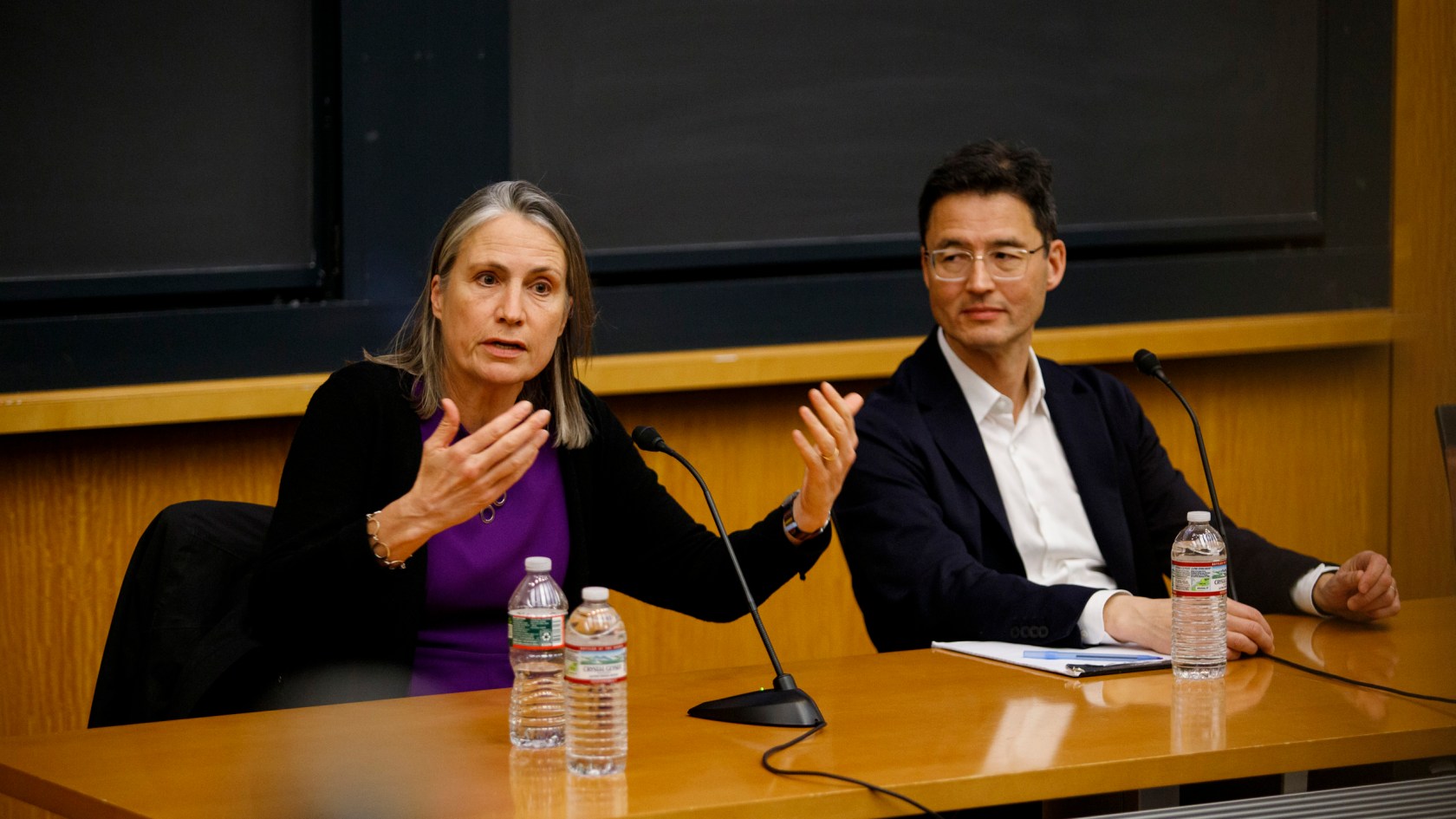
Fiona Hill and Lucian Kim.
Photo by Grace DuVal
No quick end to Russia-Ukraine war, analysts say
Former national security official Fiona Hill says that much will depend on whether other European nations step up
Don’t expect U.S.-brokered talks that began last month to end the war between Russia and Ukraine soon, analysts said during a discussion Tuesday hosted by the Davis Center for Russian and Eurasian Studies at Harvard.
Though Ukraine agreed to an unconditional ceasefire, Russia ramped up missile and drone attacks on Kyiv this week.
“We’re so far from a peace plan or a peace process,” said Fiona Hill, A.M. ’91, Ph.D. ’98.
Hill served from 2017 to 2019 as deputy assistant to the president and senior director for European and Russian Affairs at the National Security Council during President Trump’s first term. And she testified before Congress during Trump’s impeachment trial in 2019.
Russia President Vladimir Putin has no incentives to end the war, but plenty to engage in talks in hopes of normalizing relations with the U.S., agreed Hill and panelist Lucian Kim, a senior analyst for the International Crisis Group. The conversation was moderated by Evgenia Albats, Ph.D. ’04, a Russian political scientist and journalist who is currently a visiting scholar at the Davis Center.
Putin’s vision for a Russia reunited in some form with Ukraine and his willingness to let casualties mount make getting a lasting deal very limited, she said, as does a relatively inexperienced U.S. negotiating team.
Both Putin and Ukrainian President Volodymyr Zelensky know that Trump’s primary goal is to broker a peace deal, even if it doesn’t last or harms Ukraine, said Hill, now a senior fellow at the Brookings Institution’s Center on the United States and Europe and a member of the Harvard Board of Overseers.
“Trump is trying to force a peace deal [that] seems to be on Putin’s terms,” so that he can reset U.S.-Russia relations, something he tried to accomplish in his first term, she added.
Without intelligence and military support from the U.S., the “most likely” outcome for Ukraine is that it will have to cede territory to Russia. At this juncture, the notion that Ukraine could somehow retake Crimea and Donetsk is “almost hard to imagine,” said Kim, a former Moscow-based correspondent for NPR and Bloomberg.
But even a negotiated shift of territorial borders won’t be enough to satisfy Russia, he added. “Putin is not going to rest until Ukraine is subordinated to the Kremlin.”
The conflict in Ukraine has long been seen by Russia and its allies, China, Iran, and North Korea, as a proxy war with the U.S. How they react if the U.S. walks away from the conflict entirely is now the most important question, particularly for Europe, Hill said.
“This is now a European war, very clearly,” one that will test the region’s security and unity, she said.
Analysts agreed that Europe has more defensive capacity than it gets credit for. Many countries understand Russia poses a threat to their own individual security and have upped defense spending in recent years.
Others have been newly energized to beef up their fighting forces since Trump returned to office. But getting a coalition of individual European armies coordinated, trained, and fully prepared to step in to assist Ukraine if necessary will take time, perhaps more than the besieged nation has.
“The only hope that the Ukrainians have now is the Europeans somehow getting their act together,” said Kim.
Ukraine had the firm backing of President Joe Biden, Kim said, but even then the relationship between the two nations was far from perfect.
The Ukrainians had a very “high level of frustration” with the limits the administration put on what weaponry it shared and how it was to be used and the slow pace of deliveries. It was an overly cautious approach, they felt, driven by the fact that Biden and his team did not see the war as an existential threat to the U.S.
Also shaping the U.S. approach to military assistance in Ukraine, Hill said, was that the Biden administration’s first priority from the war’s earliest days was avoiding a nuclear World War III rather than doing whatever necessary to ensure that Ukraine defeated Russia.
During a recent trip to Ukraine, Kim said he never once heard Biden’s name mentioned and got the sense that few missed his administration. As early as last summer, there were signs Ukraine held out “a naive hope” about what might be possible in a second Trump term.
“People thought Trump, despite his record already in Ukraine during his first term, would somehow be able to rattle up the situation enough that there would be a better outcome than if the war simply continued in its present direction,” said Kim. But, he said, the Ukrainians have since been “disabused of those illusions.”




